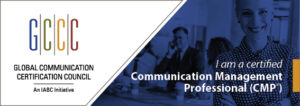
Communication plans often include these six key components:
- Communication goals and objectives
- Target audiences
- Communication strategies
- Tactics and/or activities
- Evaluation tactics
- Budget, materials, timetable and/or task list
Here we’ve customized the basic outline of a communication plan
for purpose-driven organizations.
And, we’ve included a central question that each component should be able to answer. Here we go… Number 1 through 6…. (If you prefer a PDF version, download a copy here.)
#1: Communication Goals and Objectives
- Should be consistent with organization’s mission (i.e.,purpose)
- Should be limited to three to five statements; although one may be enough
- Should consider desired outcome
- Examples: Increase awareness, change perception, take action
- Use verbs to indicate activity
- Should describe end result; not process
- Should be a measurable outcome, specific to each target audience and include timeframe
What does success look like?
#2: Target Audiences
- Should include groups your organization needs to communicate to, and also listen to
- Should consider internal and external stakeholder needs and interests
- Should consider whose support the organization needs
- Should consider who the organization supports
Who are our target audiences and why are they important to our organization?
#3: Communication Strategies
- How will you work toward reaching each separate goal?
- What existing resources can you use to achieve each goal?
- Should include key messages for each goal; and be specific to each target audience
- Key messages can also have sub-messages
- Key messages should have proof points
- Should outline several strategies for each goal; some strategies may repeat
What themes or appeals will you use to reach your objectives?
#4: Tactics and/or Activities
- Should outline what communication activity will be used
- Should describe which communication tactic (vehicles or channels) will be used
How will we do the work to reach our objectives?
#5: Evaluation Tactics
- Should consider if objectives are being met
- Should include measurements, observations, opinions and audience feedback
What needs to change?
#6: Budget, Materials, Timetable and/or Task List
- Should consider what resources are needed to meet objectives
- Should consider out-of-pocket costs, employee time, materials, etc.
- Should apply timetable to tactics, activities and/or tasks
How best to manage this project?
What communication challenges does your organization face? What do you think of this communication planning model for purpose-driven organizations? Please comment or reach out to me; I’d love to hear your thoughts.
Good luck!
The image is from one of our favourite stock photography websites: Unsplash.com and is by Philipp Reiner.





